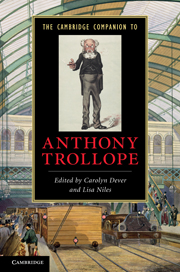Book contents
- Frontmatter
- Introduction
- 1 Trollope’s Literary Life and Times
- 2 Trollope As Autobiographer And Biographer
- 3 Trollope’s Barsetshire Series
- 4 The Palliser Novels
- 5 Trollope Redux: The Later Novels
- 6 Trollope’s Short Fiction
- 7 Trollope And The Sensation Novel
- 8 Queer Trollope
- 9 The hobbledehoy in Trollope
- 10 The construction of masculinities
- 11 Vulgarity and money
- 12 Trollope and the law
- 13 Trollope and travel
- 14 Trollope and the Antipodes
- 15 Trollope and Ireland
- 16 Trollope and America
- Further reading
- Index
- Cambridge Companions to . . .
10 - The construction of masculinities
Published online by Cambridge University Press: 28 March 2011
- Frontmatter
- Introduction
- 1 Trollope’s Literary Life and Times
- 2 Trollope As Autobiographer And Biographer
- 3 Trollope’s Barsetshire Series
- 4 The Palliser Novels
- 5 Trollope Redux: The Later Novels
- 6 Trollope’s Short Fiction
- 7 Trollope And The Sensation Novel
- 8 Queer Trollope
- 9 The hobbledehoy in Trollope
- 10 The construction of masculinities
- 11 Vulgarity and money
- 12 Trollope and the law
- 13 Trollope and travel
- 14 Trollope and the Antipodes
- 15 Trollope and Ireland
- 16 Trollope and America
- Further reading
- Index
- Cambridge Companions to . . .
Summary
The world
More than in any other novelist, the construction of masculinities in Trollope involves the creation of a functioning fictional world in which individual characters are to live and act. It even involves the construction of the narrative voice or voices, and of the readership too. Trollope presents the life of individuals in a complex world, concentrating on the moral choices which individuals make in relation to that world. Ruth apRoberts shows that he pays attention to the minute particulars of each case, and that, although not a moral relativist in the sense of appealing to different standards in different cases, he espouses a situational ethics which takes account of the circumstances of the individual in each instance, which he examines as a case of conscience, rather than by drawing on moral or religious rules for guidance. In this Trollope’s characters are exercising what we might call their “secular consciences.” Although deeply interested in “the gentleman” and values of gentlemanliness, Trollope is not a campaigning novelist. His chief subject is how best, given one’s temperament and circumstances, to make life choices which enable one as far as possible to live a moral and fulfilling life in an admittedly imperfect world.
- Type
- Chapter
- Information
- The Cambridge Companion to Anthony Trollope , pp. 128 - 141Publisher: Cambridge University PressPrint publication year: 2010

